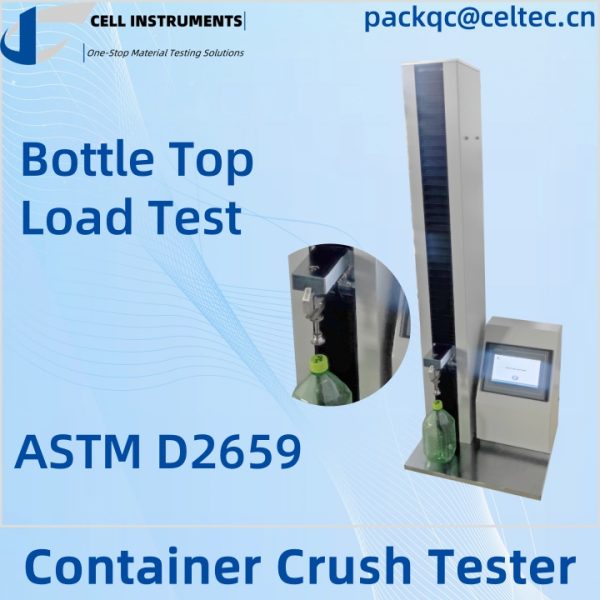How to Use a Container Crush Tester for ASTM D2659 Crush Test Compliance
Container crush testers are essential tools in the packaging industry, playing a critical role in ensuring that containers—ranging from bottles to boxes—can withstand the stress of stacking, shipping, and storage. This article delves into the importance of these testers, their applications, and how they comply with industry standards such as ASTM D2659, ASTM D4577, and ISO 8113.
The Importance of Container Crush Testing
Packaging must protect products from damage during transportation and storage. Container crush testing evaluates a package’s ability to endure external pressures, ensuring that it doesn’t deform or collapse under load. For manufacturers, this testing not only prevents costly product returns but also helps optimize packaging materials, leading to cost efficiency without compromising strength.
How Container Crush Testers Work
Container crush testers apply a compressive force from the top of the packaging to simulate real-world conditions. During testing, the force gradually increases until the package deforms or collapses, allowing manufacturers to determine the container’s maximum load capacity. The instrument measures both the force applied and the amount of deformation, ensuring packages meet performance criteria established by standards like ASTM D642 and ISO 8113.
Top Load Testing and the Bottle Industry
For bottle manufacturers, top load testing is especially vital. This method involves placing a bottle on the tester’s platform, where it is subjected to increasing compressive force from the top. The test mimics the pressures experienced during storage and transportation. The bottle top load test ensures that the bottle can maintain its structural integrity even under heavy loads, crucial for preventing product leakage or breakage. The Cell Instruments Container Crush Tester can conduct both standard container crush tests and top load tests, meeting the exacting demands of the bottle industry.
ASTM D2659 Crush Test Compliance
The ASTM D2659 crush test is one of the most recognized standards in the packaging industry. It specifies the procedures for testing rigid plastic containers under compressive loads. The goal is to determine the compressive strength, stiffness, and the behavior of the container when exposed to a specified force. By following ASTM D2659, manufacturers ensure that their products meet regulatory requirements and maintain packaging integrity during distribution.
Features of the Cell Instruments Container Crush Tester
The Cell Instruments Container Crush Tester is specifically designed to meet the rigorous demands of various packaging materials. Equipped with a 7-inch HMI touch screen, PLC control, and a precision ball lead screw mechanism, this tester ensures accurate results in every test. The tester allows for adjustable test speeds and can be customized with compression plates of different shapes and diameters, making it versatile for testing various container types.
Enhancing Packaging Efficiency
Container crush testing aids in the optimization of packaging design. By understanding a container’s compressive strength, manufacturers can adjust material usage, ensuring the package is both strong and cost-effective. This balance is essential, especially in industries like food, beverages, and pharmaceuticals, where packaging plays a critical role in product safety and brand reputation.
Ensuring Compliance and Quality with Container Crush Testers
With industry standards like ASTM D2659, ASTM D4577, and ISO 8113 guiding packaging requirements, container crush testers have become indispensable in the industry. By using reliable testers like the Cell Instruments Container Crush Tester, manufacturers can guarantee that their packaging is compliant, durable, and ready for the stresses of real-world conditions.
FAQ
What is the purpose of a container crush test?
The container crush test determines the compressive strength of packaging materials, ensuring they can withstand the stresses of shipping, stacking, and storage.What is a bottle top load test?
A bottle top load test evaluates the structural integrity of bottles by applying a compressive force from the top to simulate real-world stacking and storage conditions.Which standards apply to container crush testing?
Key standards include ASTM D2659, ASTM D4577, ASTM D642, ISO 8113, and ASTM D4169, which outline the procedures for evaluating packaging strength under compressive loads.How does the Cell Instruments Container Crush Tester improve packaging design?
It helps manufacturers optimize packaging materials, balancing strength and material usage while ensuring compliance with industry standards.Can the Cell Instruments tester be used for multiple types of containers?
Yes, it’s compatible with various compression plates, making it suitable for bottles, boxes, cartons, and more.

